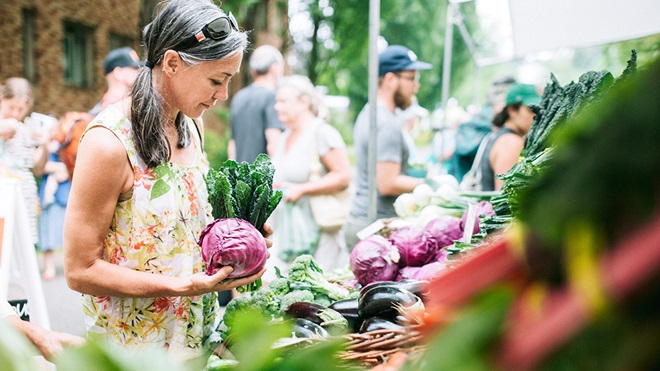Australian shoppers' demand for organic food is growing at a rate of 20–30% per year, and it's estimated that more than six out of every ten Australian households now buy organic foods on occasion.
After all, eating organically-grown food that's been produced without as many pesticides, additives, antibiotics or other chemicals sounds like something we should all be doing if we're concerned about our health. Not to mention the fact that organic farming practices are generally more sustainable and better for the environment.
But organic food is often considerably more expensive than the standard options you find in the supermarket or greengrocer, and may feel out of reach for many who are on a strict budget.
Organic products are pricier because organic farming is usually on a smaller scale, so production is more labour-intensive and the yields from crops are usually smaller (as they haven't been boosted by the use of herbicides, pesticides and other chemicals).
If you want to add more organic products to your diet but are looking for options that mean you can splash less cash, here are some tips to try.
1. Grow your own produce
OK, so this isn't possible for everyone, and takes a bit of dedication. Plus unless you have a huge vegie patch, it's unlikely you'll be able to grow enough fresh produce to sustain you completely. But even if you can grow one or two things yourself (start with the easier things such as a pot of parsley or basil, some tomatoes or zucchini… ), you can control what pesticides, fertilisers and garden products you use or don't use.
2. Be selective
Some conventional foods use more pesticides in their production than others. So if you can't afford to buy everything organic but it's important to you, there are some products that are worth spending more on buying organic than others.
Plants that easily absorb chemicals or are more difficult to wash chemical residues off include things such as leafy greens (spinach, kale, broccoli) and soft fruit with a thin skin such as tomatoes, strawberries, grapes and peaches, so these are worth adding to your organic shopping list.
Fresh produce with thick skins are less likely to contain high levels of chemicals, such as pumpkins, avocadoes, melons and pineapples, are a less of a priority if you're trying to save extra dollars.

Look for the Australian certified organic logo on food products.
3. Look for cheaper cuts of meat and discount shelves
Even if you're not buying organic, buying cheaper cuts of meat and taking advantage of supermarket discount shelves that have produce that's overripe (or about to be) at cheaper prices is a great way to save on your shopping. Organic chicken thighs can still be cheaper than buying organic chicken breasts!
4. Be wary of product labelling and avoid non-agriculture 'organic' products
'Organic' is a label that can be misused on Australian food products. You should always look for products that are labelled 'certified organic' by one of the seven Department of Agriculture, Water and the Environment (DAWE) accredited certifying organisations. If you can only afford to buy certain organic products, it's best to stick to spending your money on fresh organic products or meat/animal products.
CHOICE food and nutrition expert Rachel Clemons says, "If you're trying to save money on organic, avoid ultra-processed 'organic' snack food. And products such as water and salt aren't products of agriculture, so an organic label on these products is meaningless and not worth paying a price premium for."
5. Buy in season, local and from grower's markets where possible
Organic food from a local grower's market or local organic producer may be cheaper than from major retailers, and will likely mean you can access fresher produce that has had a shorter journey from paddock to plate. Plus, you get the added benefit of being able to support local businesses.
Whether or not you're buying organic, choosing in-season fruit and vegetables is always cheaper as supplies are more abundant.
We're on your side
For more than 60 years, we've been making a difference for Australian consumers. In that time, we've never taken ads or sponsorship.
Instead we're funded by members who value expert reviews and independent product testing.
With no self-interest behind our advice, you don't just buy smarter, you get the answers that you need.
You know without hesitation what's safe for you and your family. And our recent sunscreens test showed just how important it is to keep business claims in check.
So you'll never be alone when something goes wrong or a business treats you unfairly.
Learn more about CHOICE membership today
Stock images: Getty, unless otherwise stated.



